Peter MALONE
Saturday, 18 September 2021 19:23
Terra Incognita
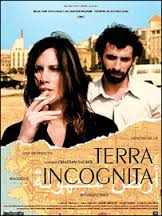
TERRA INCOGNITA
Lebanon, 2002, 120 minutes, Colour.
Karol Aboud, Abla Khoury, Walid Sadek.
Directed by Gassan Salhab.
Terra Incognita is a film about Lebanon, directed by Gassan Salhab who grew up in Senegal and returned to Lebanon at the age of 17. He experienced the war, went to France, began to make films and decided that he could make a film only based on his own experience in Lebanon.
1. The impact of the war on Lebanon? Its long duration, the destruction? The incursions by Israel and the bombings in South Lebanon? The context for the characters?
2. The use of the city, as part of the atmosphere, even a character? The landscapes of Lebanon, of northern Israel? The ruins and their being symbolic of Lebanon's long past? The ruined cities of the present and the need for a new building of Lebanon? The musical score, the songs inserted throughout the film? The music at the wedding?
3. Characters within this context? Their age, experience, work? Influenced by the war and its aftermath? Their searching? Their uncertainties?
4. Soraya and her work as a guide, the tourists, her relationships, her friendships, the wedding, the guiding the tourists in northern Israel? Her being pursued, her being assaulted - the final close-up of her bruised face?
5. Leyla and her withdrawing from people, her uncertain reflections, her questions? Her relationship with Soraya? With the men?
6. The men, working on computers and rebuilding the city - but not good on relationships? The man coming from Senegal and trying to settle in Lebanon? The bridegroom?
7. The wedding sequence, the preparations, the arrival of the guests, the talk, the ceremonies, the singing?
8. The long journey and pursuit of Soraya to Israel? The streets, the roads, the mountains, the border? The ruins? The assault and the ending?
9. The audience immersed in the film as observers of place and character rather than following a story and its emotional impact?
Published in Movie Reviews
Published in
Movie Reviews
Tagged under
Saturday, 18 September 2021 19:23
Till Human Voices Wake Us
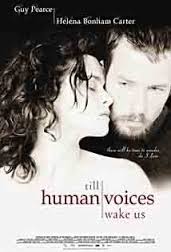
TILL HUMAN VOICES WAKE US
Australia, 2002, 104 minutes, Colour.
Guy Pearce, Helena Bonham- Carter, Lindley Joyner, Frank Gallacher.
Directed by Michael Petroni.
"Till human voices wake us" is a quotation from the early stanzas of The Love Song of J. Alfred Prufrock by T.S. Eliot. The overtones of the stanza are of water and drowning and death. The title is evocative of this story of a psychologist who goes back to his country Victorian home to bury his father. His memories and dreams take him back to the time when he was in love with a young girl, Silvy. They shared everything together and, on the night of the town dance, she drowned.
As he comes back to the town, he encounters a strange young woman on a train and then sees her throw herself from a railway bridge into the river. He saves her, takes her home, tries to understand her, break through her amnesia, hypnotises her and then discovers that she is the spirit or the ghost of Silvy. This enables him to come to terms with his past - presented symbolically by his going to swim in the river which drowned her.
Guy Pearce once again shows his versatility in presenting a very restrained young man, repressed as he tries to forget his past and not live emotionally. He is well supported by Helena Bonham-Carter? as the ghost. Young Lindley Joyner is excellent as the young Guy Pearce. The film is written and directed by first-time director Michael Petroni. The story is so vivid and the re-creation of country Victoria so strong, that one suspects a number of autobiographical elements in the film.
1. The title, the quotation from T.S. Eliot and The Love Songs of J. Alfred Prufrock? The context of death and drowning?
2. The beauty of the Victorian countryside, of the past, of the present? The town of Genoa? The surroundings, the bush, the river?
3. The themes of death, of Sam's father, of Silvy? The film as a ghost story, a sense of the supernatural and the transcendent? The interaction between this world and the next? The purgatorial themes and reconciliation?
4. The opening and Sam giving the lecture on memory, willing memory, repressed memory? The world of imagination and dreams? His comment about not dreaming and psychoanalysts not willing to dream? Ruby's response about all dreaming but not remembering? The importance of the musical score and its dreamlike qualities accompanying the flashbacks as well as the present?
5. Sam as an adult, lecturing, the news of his father dying, playing the chess game with him, his father's quiet death, literally looking him in the eye and seeing his own reflection in his father's eye? The discussions about the funeral? The importance of his father's wishes, the property at Genoa, going back in the train?
6. The structure of the film moving between the present and the past via such devices as the train carriage, the photos, the rooms, the landscapes?
7. The gradual revelation about Sam and his life story? Of Silvy and what happened to her? The introduction to Ruby on the train, her presence and sudden disappearance? The irony of the Scrabble game and "Ruby, me" - and Sam's changing it to "bury me"?
8. Sam as a young boy, going home for the holidays in the train, Russ giving him a lift home, his relationship with his father, his father's practice and patients, at home with his father, drawing the beetle, his going out on his bike, the friendship with Silvy, their bike rides together, talking, sharing so much, shared imaginations, the swimming? The audience learning about Silvy and the braces on her legs? His going to work with Silvy's father, learning wisdom from him, the birth of the calf and the father talking about people facing the truth and not covering it? Sam as a strong young boy, pleasant young boy? The irony that he would have turned into the repressed adult Sam?
9. The dance, their leaving, going to the water, the kiss, the discussions about the moon and the river and the reflections? Silvy's drowning? Its effect on Sam, his weeping, going to his father? Going to Silvy's father, his father building the boat, explaining to Sam about growing pains?
10. His father's funeral and its effect on him?
11. Going back to the house, the camera wandering the house with Sam, the rooms and their memories, presences and absences? His looking at the box of memories, the photos, especially of Silvy? His dozing and sleeping? How much was memory, how much was dream?
12. His going out in the rain, driving, seeing Ruby standing on the bridge, her falling, his rescuing her from the water? Her not drowning? Taking her back to the house, keeping vigil with her, her weakness, her talking, eating, playing Scrabble - Ruby and "bury me", her being the first guest in the house? Her amnesia, some of the memories, Sam and his decision to hypnotise her, going back, her reliving the past, revealing who she was, the experience of drowning and Sam trying to save her? Their sexual encounter and the culmination of their love?
13. Sam wanting her to tell him the truth and what he was to do, the quotation from T.S. Eliot and the book of poetry, her dying and the description of her experience? Her dying again but in peace?
14. Sam getting the boat, putting her on the boat, going into the water and swimming, the experience of water as cleansing, refreshing, regeneration and freeing? Her disappearing from the boat? His getting into the boat, lying in peace, floating towards his new future?
15. The effectiveness of the themes of life and death, emotions and love, regeneration and renewal, symbols of water, the discussions about spirit and the soul and freedom?
Published in Movie Reviews
Published in
Movie Reviews
Tagged under
Saturday, 18 September 2021 19:23
Tosca
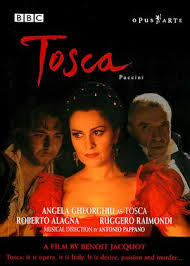
TOSCA
France/Germany/Italy/UK, 119 minutes, Colour.
Angela Gheorghiu, Roberta Alagna, Ruggiero Raimondi.
Directed by Benoit Jacquot.
Tosca is a film version of Puccini's celebrated opera. The director is Benoit Jacquot, a director of French dramas which, at the end of the 20th century, included Pas de Scandale and Sade. A friend urged him to do this opera. He decided to do it in three different ways: rehearsal sequences are filmed in black and white video and are introducing the film, interspersed with the first act, and used as the conclusion; he added video sequences, of a rather blurred style, of the locations in which the opera takes place, Rome, the Church of San Andrea Della Valle and the Castel San Angelo - declaring that the grainy images are similar to the kinds of images that may be going through audiences' minds as they listen to the music; the opera itself done in brilliant and stark style on sound stages resembling the church, Castel San Angelo, its towers. The latter part of the film, the major part, is done in strikingly vivid colours, especially Tosca in the second and third acts in her long flowing red dress.
Puccini's opera runs for two hours, an ideal length for an opera film, according to Jacquot. He lets the music speak for itself, often highlighting the three principals in long close-ups and at different angles for the dramatic impact of their singing. Angela Gheorghiu is a strong and beautiful screen presence, making Tosca's melodramatic and violent actions credible. Her husband, Roberto Alagna, is the cavaliere, the artist who shelters a sympathiser to Napoleon and becomes the victim of the governor of Rome, Scapia. Ruggiero Raimondi is excellent as Scapia, singing magnificently as well as conveying the menace and abuse of authority.
Opera fans will be interested in this interpretation of the story. The issues of the story are the social background of Rome, a dictatorship and violence in its administration, the background of the Napoleonic wars and the defeat of the Italians at Marengo. The film also plays on themes of religion, the first act taking place in the church where the cavaliere is painting a portrait of a woman to whom he is attracted and where he meets his diva mistress, Tosca. It has themes of love, betrayal, lust, self-sacrifice.
The film joins a number of films of operas directed by significant directors (rather than opera directors). They include Losey's Don Giovanni, Bergman's The Magic Flute, Rosi's Carmen, Zeffirelli's La Traviata and Othello, and the series of ten stories with operatic arias, directed by ten directors, Aria.
Published in Movie Reviews
Published in
Movie Reviews
Tagged under
Saturday, 18 September 2021 19:23
To Dorothy a Son
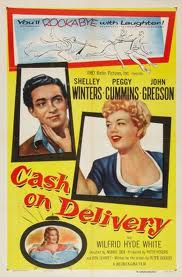
TO DOROTHY A SON
UK, 1954, 84 minutes, Black and white.
John Gregson, Shelley Winters, Peggy Cummins, Wilfred Hyde- White, Mona Washburn, Joan Sims, Joan Hickson, Alfie Bass.
Directed by Muriel Box.
To Dorothy a Son is one of the many short-length films that served as features in the UK during the '50s, as well as supporting features throughout the world at the same time. The film is slight, shows England in its immediate post-war period in the '50s, the relationship between the US and the UK. It also has a picture of marriage, divorce, family and babies? There is the contrast of the high life in New York City with the ordinary life in London and in the Suffolk countryside. The film capitalises, for its comedy, on the quaint touches of the British character. Peggy Cummins gives a strident performance as Dorothy. Shelley Winters mugs as Myrtle. It is up to John Gregson to keep the whole proceedings on an even keel, but he is hard-put because of Dorothy's whims. There are good character performances by Wilfrid Hyde-White? and other British character actors who were to be the staple of British film and television for the next decades.
1. A '50s British comedy, entertaining, stilted in its style?
2. The black & white photography, London, Suffolk, the contrast with New York City?
3. The cast and their interactions, the musical score, the songs, American glamour, the contrast with Britain?
4. Tony and his writing music, his life with Myrtle, their marriage in Tonga, the divorce in Bolivia? Each going their own way, Tony marrying Dorothy and changing his name, continuing to compose, Dorothy's pregnancy? Her whims, their having no money, the nurse coming in daily, the landlord taking the furniture, the producer ringing? The garage and its mix-ups? The chats with the phone exchange? Tony and his frustrations?
5. Myrtle as the goodtime girl, her singing and rehearsing in New York City, the marriage in Tonga, the tour, divorce in Bolivia, her career, boyfriend? The will, the lawyer explaining things, her decision to go to London to search for Tony, the advertisements, Mr Stark? Going to the private investigator, the phone book, the phone calls, the visits and their frustrations? Her using her wiles with Tony when she found him, staying at the inn and exerting her glamour, finally telling the truth about the nature of the will?
6. Dorothy, strident, moods and whims, jealous of Myrtle? The birth - and twins?
7. Mr Stark and Wilfrid Hyde-White's style, supporting Myrtle, the golf, realising the time limit in Tonga for valid marriages? The nurse and her accidents on the bike, her practical kindliness? The driver turning up and not being needed? The proprietor of the inn and his bossy wife? The gossip at the phone exchange?
8. The conditions of the will, the timing, the time zones, daylight saving? Each being willing to share with the other?
9. A pleasant British comedy of the period, a typical vehicle for the stars and cast? British domestic issues in films of the time?
Published in Movie Reviews
Published in
Movie Reviews
Tagged under
Saturday, 18 September 2021 19:23
Time Machine, The
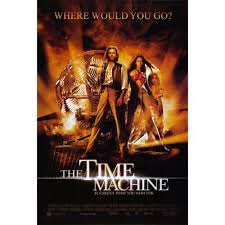
THE TIME MACHINE
US, 2002, 95 minutes, Colour .
Guy Pearce, Samantha Mumba, Mark Addy, Sienna Guillory, Jeremy Irons, Phyllida Law.
Directed by Simon Wells.
Many parents and grandparents have happy memories of the 1960 version of H.G.Wells' The Time Machine with Rod Taylor. It took them into future worlds like those of Jules Verne. In those days, the film studios were developing special effects to spark the imaginations of young audiences. These days, there are so many marvels of special effects movies that it is very hard to top them, especially the Star Wars series and, now, The Lord of the Rings.
The director of this version is Simon Wells, great grandson of the author himself, who was responsible for the animated feature about Moses some years ago, The Prince of Egypt. Wells obviously relishes the chance to make a film of his ancestor's novel and, while not in the same league as the huge blockbusters, there is enough here to satisfy an audience who enjoys imagining the future. The makers obviously respect the 1960 film because they actually refer to it and many of the scenes echo the earlier film.
The action has been changed to New York at the turn of the 20th century. Alexander Hartdegen is a maths professor and an inventor. When his fiancee is killed during a mugging in the park, Alexander builds his time travel machine to go back to save her. He is unable to. He then decides to visit the future. In the 21st century, he finds technology so developed that a personalised computer hologram (played by Orlando Jones) is programmed with all human knowledge and is on duty in the museum. Later, Alexander finds that colonising of the moon has so affected the lunar environment that the moon is breaking up and hurtling meteoric pieces towards earth.
Felled in his attempt to escape, Alexander sets his machine in motion but does not regain consciousness until he is more than 800,000 years into the future. Humanity has regressed, the Eloi being the humane survivors who are hunted by the Morlocks, ugly, voracious monsters who are controlled by a highly intelligent albino Uber-Morlock?, played in sepulchral tones by Jeremy Irons. By now, the quiet professor has had to become something of the Indiana Jones of 800,000 and fight the Morlocks to save the Eloi.
Perhaps this is part of Wells' genius in telling his story. He combines speculation about the future with a quiet hero who has to turn adventurer. In 1960, Australian Rod Taylor played the part. In 2002, Australian Guy Pearce is convincing as the introspective academic, disappointed in love, who goes into action hero mode. Popular singer, Samantha Mumba, is Mara who befriends the professor.
Families with older children should enjoy it. Some of the Morlocks and the confrontations and chases may be too frightening for the very young.
1. The classic status of H.G. Wells' story? The film version of 1960? Audience interest in the theme, the book, the film? This film paying homage to the previous one?
2. New York City 1900, the elaborate detail of the sets and décor, of the house, laboratory, the streets, the park? The comparison with the passing of time during the 20th century? The 21st century and the museum, Vox? The transition to the colonising of the moon, not respecting the moon's environment, its breaking up and hurtling towards the earth? 800,000 AD and regression, the caves and the precipice homes? Hunters and hunted? Audience interest in the theme, the book, the film? This film paying homage to the previous one?
3. New York City 1900, the elaborate detail of the sets and décor, of the house, laboratory, the streets, the park? The comparison with the passing of time during the 20th century? The 21st century and the museum, Vox? The transition to the colonising of the moon, not respecting the moon's environment, its breaking up and hurtling towards the earth? 800,000 AD and regression, the caves and the precipice homes? Hunters and hunted?
4. The special effects, the time machine itself, its mode of travel, Vox as a hologram, the moon and its break-up, the pursuits in the future? The musical score and its old classic style?
5. Simon Wells and his vision, respect for his ancestor? Glimpses of the future in the Jules Verne style? Interpreting the present and its meanings through the past and the future? How prophetic was H.G.Wells? This film?
6. Alexander Hartdegen: the maths professor, absent-minded academic, relationship with the students, with Philby, with Mrs Watchit, his relationship with Emma? His getting ready to go out, his friends looking after him, going to buy the flowers but looking at the car, meeting Emma discussions, the proposal, the ring, the robbery and the killing, Alexander's grief?
7. Four years alone, Philby coming to visit him, Mrs Watchit looking after him? His plan to return to the past, building the machine, going to save Emma, meeting her early, the proposal, the accident and her death? Fated to die?
8. Alexander's motivations, feelings, the academic and introspective man becoming a time-traveller, seeing the changes in the world, going into the future?
9. The 21st century and the museum, the children and the teachers, Vox and his lectures, discussions, the computer programmed with all human knowledge? Alexanders discussion with Vox? The date of his own death and the summary of his eccentricity? In the future, Vox still there centuries later, the finale and teaching the children? The roles of computers, programming, knowledge, holograms and personality?
10. The colonialising of the moon, the ruined New York City, its collapse, hurtling to earth, the guards taking Alexander, his escape?
11. Unconscious, going to the future, 800,000 years hence? The dry earth, the deserts, the replenishment with the forests, the continual evolution and change? The future and the Eloi, their language, puzzle about the visitor, Mara and her brother, knowing English, befriending Alexander, explaining the culture? Becoming friendly with the Eloi? The contrast with the Morlocks, their attack, their victims? The dangers in the homes on the precipices? Alex and his response to the Marlock attack, becoming an action hero? Love for Mara?
12. The Morlocks as monsters, spying and hunting? The Uber-Morloc? as the control, the albino, intelligent, his deformities, subterranean? Jeremy Irons' visual and verbal style? The verbal jousts with Alexander, the physical fight, Alexander using the time machine to destroy him?
13. Alex and his choices, for Mara, for the Eloi? Sharing their being hunted, the pursuits through the caves? The destruction of the time machine - that it was only a machine?
14. An understanding of the future by re-examining the present and the past? Action entertainment with insight?
Published in Movie Reviews
Published in
Movie Reviews
Tagged under
Saturday, 18 September 2021 19:23
Tea with Mussolini
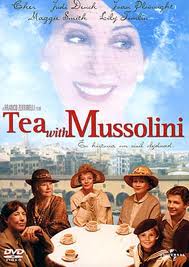
TEA WITH MUSSOLINI
Italy/UK, 1998, 117 minutes, Colour.
Cher, Judi Dench, Joan Plowright, Maggie Smith, Lily Tomlin, Baird Wallace, Michael Williams.
Directed by Franco Zeffirelli.
Tea With Mussolini was made by celebrated Italian director, Franco Zeffirelli, when he was 75. It was co-written by celebrated British author, John Mortimer. Zeffirelli had enjoyed a career in theatre both in Italy and in the United Kingdom as well as being a famed opera director. He brought several operas to the screen including La Traviata and Othello. His film work began in the '60s with his versions of The Taming of the Shrew and Romeo and Juliet. Other films included Brother Sun, Sister Moon and his later biography of Maria Callas, Callas Forever. However, his international fame rests on his television series Jesus of Nazareth.
Here he looks back into his own past before World War Two and during it. While some of the facts are historical, Zeffirelli imagines his own childhood, his studies, his being part of a group of expatriate women in Florence. He also imagines the tragedies of war including deaths and internment. He also has an escape from Nazi Italy at the end of the film.
Zeffirelli is well served by his cast, although they have done these kinds of roles before. Cher is the ultimately glamorous American. Maggie Smith, yet again, the pinched snobbish English aristocrat. Judi Dench is the rather fey artist and Lily Tomlin is the macho archaeologist.
The film is easy entertainment - designed more for a women's audience than a men's audience.
1. A World War II memoir? An Italian memoir? British memoir?
2. Franco Zeffirelli, the film based on his autobiography? His life and background, character, his place in the war, his artistic training? The legacy of the war and the British influence?
3. The re-creation of Florence in the 1930s and 1940s, its elegance and art, the British colony, the fascist presence, the brutality of the fascists, the experience of war, the occupation by the Germans? The liberation? The musical score, the songs of the period, Cher singing ‘Smoke Gets in Your Eyes’?
4. The strength of the international cast, a strong cast of women?
5. The title and the indication of themes, the English and their taking tea, their style? The Italy of Mussolini, fascism and brutality? The treatment of the English, having tea – and then interned?
6. The Scorpioni, the nickname for the British women, their presence in Italy, the romantic beliefs in Italy and its art, their presumptions about their being British and their treatment by the Italians? Mussolini and his receiving the delegation? The internment in the hotel? The war and its challenge, the end of the war – and Lady Hester still giving orders?
7. Italy during the 1930s, Mussolini’s regime, fascist beliefs, the growing link with Germany? The violence of the fascist demonstrators? The male exploiters, especially Vittorio and Elsa? The military? The portrayal of Mussolini himself?
8. Luca’s story, the story of his mother and her death, Elsa telling him the story at the end, his mother wanting him despite the reaction of his father? His father as the tailor, making the clothes for the British, his wife and her dominance? Luca and his being found by Mary Wallace, his learning English, Shakespeare, mixing with the British women? His being their pet? His father’s decision that he should be a German, sending him to Austria? His experience of school there and the Nazism? His abilities, learning, the return, life in Italy, the women and their internment? Elsa and her having given him the money for his education? His jealousy about her relationship with Vittorio? His studying art, Mary challenging him to be honest with himself? Helping Elsa to escape? His continuing to learn, his military enlistment, the end of the war and the liberation? Zeffirelli’s background?
9. Mary Wallace as a good woman, sturdy British, her care for Luca, teaching him, working with his father, making his letters less flowery? Her relationship with the other women, bringing a sense to the group? Her relationship with each of them, the internment? The confrontation with Luca about his jealousy? Her confrontation with Lady Hester and revealing the truth to her?
10. Lady Hester and her snobbery, references to her late husband, her presumption? Her dislike of Elsa as American, vulgar and immoral? Her domination of Arabella? Her relationship with the others, the stand for the group, her going to Rome, the tea with Mussolini, her believing his reassurances? The shock of the internment, her acting as the grande dame while interned, her care for Wilfred, disguising him as a woman, his leaving? Her disdain of Elsa, especially when she and Georgie were interned as Americans? The shock of the truth? Her going to help Elsa, her apology, helping with Wilfred and the escape, the end of the war – and her still wanting to dominate?
11. Georgie as the American, her archaeological work, her mannish behaviour and dress, her relationships, sardonic remarks, her place within the group? Experiencing internment?
12. Arabella and her art, the eccentric English woman, dominated by Hester, her performance and Hester cutting her off, her love for her dog? Dithering – yet kindhearted?
13. Elsa, her wealth, her marriages? Her being at home in Italy? Her husbands, the artwork, the dealers, wanting a Picasso? Her settling in, her love for Luca, supporting him financially? The clashes with Hester? The socials, her singing, her range of guests? Her return during the war, her being interned, her paying for the hotel and the others not knowing? Her infatuation with Vittorio, the affair? Believing him, the money deals, signing everything over to him? His betraying her, her being bereft? The possibility of her arrest and internment in a concentration camp? Lady Hester going to her, being able to persuade her to leave in a way the others could not? Wilfred and his help?
14. The other women, the journalist and her getting the stories, her being interned?
15. Wilfred, the young men, their being caught by the war, the internment, his being disguised as a girl, the dance – and his declaration that he was a man? Going to the Resistance, helping Elsa?
16. The cad, his charm, relationship with Elsa, the financial advice, his greediness and betrayal?
17. The art dealers, the Jews, their having to leave Italy?
18. The women and their experience of war, not as hard as so many others – but a glimpse of what internment and oppression meant? A genteel experience of war – but with reference to the wider devastation of World War II?
Published in Movie Reviews
Published in
Movie Reviews
Tagged under
Saturday, 18 September 2021 19:23
Duck You Sucker/ A Fistful of Dynamite

DUCK YOU SUCKER! (A FISTFUL OF DYNAMITE)
Italy, 1971, 138 minutes, Colour.
Rod Steiger, James Coburn, Romolo Valli, Maria Monti, Rik Battaglia.
Directed by Sergio Leone.
Director Sergio Leone retains the best laconic irony of his Clint Eastwood westerns and incorporated it into a more serious context and more handsomely mounted film which offers 2h hours of interesting and entertaining action. Set in the Mexican revolution with many parallels with Irish Troubles, the film comes out strongly against aristocratic arrogance. (Rod Steiger plays a would-be robber made hero cleverly, though eccentrically; James Coburn is good as an Irish dynamiter and lilting music frequently counterbalances and distances the violence.) It is a western with a message, but for those who dislike messages, there are many spectacular chases, explosions and battles.
1. The significance of this title and its tone in comparison with the Italian title, Duck, You Sucker, and the use of this phrase in the film?
2. How enjoyable a western was this? How good a western? How well did it use the conventions of the Italian spaghetti western: the picture of Mexican society, the use of desert locations, the amount of violence, the enigmatic characters and behaviour, the close-ups of faces, the use of colour, the use of music with varying themes and varying styles? How effectively were these used?
3. Is this film a well above average film; nearing the classic? Or is it an ordinary film? In terms of issues, presentation, style?
4. What has this film in common with the western styles of American films? How does it compare?
5. Comment on the structure of the film and its effectiveness: starting with the individual Juan, opening to his family, society, revolution, Mexico, and the vastness of this world movement at the turn of the century? The varying incidents, the interrelationships of Juan and John, the flashbacks to the Irish revolution and their inter-weaving in the Mexican revolution? The gradual build-up of action and spectacle? Were these well integrated into an effective film?
6. How important was the revolutionary background for the film? What attitude toward revolution did the film have? The initial criticism of society, sympathy for Juan and his poverty, the Irish backgrounds and their sympathy for Sean, the Mexican situation on a grander scale, the President of Mexico and his oppression, the rightness of assassinations and revolutionary activities, compared with the oppression and the firing squads etc.? What impact did this have on audiences? What attitude towards revolution did the audience have towards the end?
7. How accurate and just was the picture of Mexican society? The long opening with the people in the carriage, the President and his henchmen, Juan's watching the firing squads, the later firing squads, the picture of life in the town, the people who joined the revolution? Was revolution credible in such a society? Juan was sceptical about the ultimate effect of revolution. He said there was really no change. Was he right?
8. How much did the film rely on audience response to heroism? To Juan's heroism and to Sean's? To the questions of life and death? To the people who were killed and executed? To the emotional impact of death? Of the urge to vengeance?
9. How important for setting the tone was the initial coach-ride and the humiliation of Juan? Comment on the visual presentation of this, the food, attitudes, talk, close-ups on eyes and mouths, food? Audience response to the reversal of the situation and the humiliation of society?
10. What ironic comment was made by Juan and his family using the coach for their own snobbish purposes?
11. The initial impact of Sean and his blowing-up of the coach in answer to the shooting of his tyres? What impact did Sean make as a person? His assurance? His revolutionary I.R.A. background? The link with Juan by name? His escaping from Juan and yet his later using him in the city? The bonds between the two as they grew in the revolution? Sean's skill as an explosive expert and audience response to this?
12. The importance for the film of the siege at the bank - how well was it filmed, how exciting and interesting? The reality for the revolution in liberating prisoners? The impact on Juan's life that made him a hero? (preparation for this in the train ride, the murder of the soldier the doctor's help for him?) The reality of the revolution in comparison with the farcical dream of having the bank and the gold?
13. The impact on Juan of being a hero? His dissatisfaction with it? His wanting to live with his family and sons? The importance of the siege at the bridge - how well filmed and exciting? And the harrowing experience of the deaths of the children?
14. The ironic comment of the firing squad, the doctor's betrayal, the memories of the I.R.A.. and the effect on Juan?
15. The anti-climax in Juan's being rescued from the firing squad?
16. How fitting a culmination for the film was the spectacular train crash, the doctor remaining a hero. Sean being a hero, Juan also? The sadness of Sean's death by the German officers?
17. The ultimate judgement on heroes?
18. How important were the flashbacks on Sean and the tone that they gave to the film - colour, scenery, music?
Published in Movie Reviews
Published in
Movie Reviews
Tagged under
Saturday, 18 September 2021 19:23
55 Days at Peking
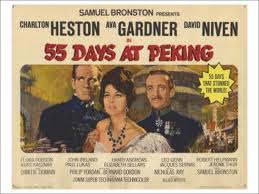
FIFTY FIVE DAYS AT PEKING
US, 1963, 155 minutes, Colour.
Charlton Heston, Ava Gardner, David Niven, Flora Robson, Leo Genn, Robert Helpmann, Kurt Kasnar, Paul Lukas, Harry Andrews.
Directed by Nicholas Ray.
Fifty Five Days at Peking is one of the series of films made by Samuel Bronston in Spain in the early 60's: King of Kings, El Cid, Fall of the Roman Empire, Circus World. The films had huge budgets, big stars, huge sets built in Spain, directors Nicholas Ray and Anthony Mann. Unfortunately, Bronston went bankrupt after making this series.
Fifty-five Days at Peking is very enjoyable, a bit slow moving at times, but good action. It is spectacular history, giving some insight into isolationist China, the pressures of the international powers on China round 1900, the possibilities of surviving a siege.
1. How important were the spectacular elements of this film? How important the political and dramatic theme?
2. How did the opening (and the ending) with the dissonance of the various nations in Peking give an atmosphere to the conflict of the film?
3. China - was its political situation in 1900 explained and shown clearly? Did the narrator's explanation help? Who were the Boxers? Why were they powerful? What sequences illustrate this best? Why did the Empress tolerate them? What were their goals?
4. What were your impressions of the Chinese court, the Empress, the Prince, the General, their styles, belief in China, attitude to European and world powers?
5. Was the European situation in Peking well presented, isolation, power-struggles in homelands, fears?
6. Matt Lewis was central to the film - how were his character and attitudes quickly communicated? American, cavalry, attitude to the Boxers, disturbances in the city, buying the priest? The influence and style of the Americans?
7. Sir Arthur and the English - their power, influence, style? Sir Arthur's diplomacy? Sir Arthur as a person, relationship with his family, his style of entertaining? His advice to Lewis to leave?
8. The Russians in Peking - the Baroness and her place in Peking with the Chinese General? The importance of the incident with the room? Her clashes about the jewellery?
9. The importance in the film of the banquet? The magnificence of Prince Tuan's arrival, the Boxer demonstration for the Europeans? Lewis's humiliation of the Boxers, the applause of the German Minister and Lewis seeing the Prince give the signal for the assassination?
10. Panic in Peking - was this understandable? What could those there do with their responsibilities to their countries?
11. The significance of the visit of Sir Arthur and Lewis to the Empress and the execution of the Boxers?
12. The siege, Sir Arthur's influence and diplomacy - was this wise? How well was the siege prepared for? Were there any real alternatives? Lewis's failure in his mission? How frightening was the siege? The shooting of the boy, the flame throwing machines, the waves of Chinese?
13. What dramatic balance to the film did the orphanage sequences make? Were they sentimental? The girl, the shooting of her father, Lewis's concern, the contribution of the old priest?
14. Why did the Baroness not try to escape? Should she have gone? Was her transformation credible? Her work, her responsibility for the dying man?
15. The character and dedication of the Doctor?
16. Was the plan for blowing up the arsenal a good one? How accurately was it filmed? How strong a blow and humiliation was this for Prince Tuan, especially in view of his military planning clashes with the General?
17. The influence of the Baroness in obtaining medicine? Her death? What had she achieved by the time of her death?
18. How dramatic was the coming of the tower to the siege wall?
19. How tragic was the humiliation of the Empress and China?
20. What attitudes to imperialism and colonialism did the film have? The irony of the dissonance at the end?
Published in Movie Reviews
Published in
Movie Reviews
Tagged under
Saturday, 18 September 2021 19:23
Conflict
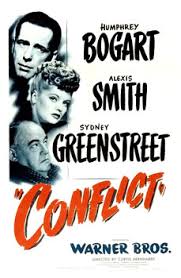
CONFLICT
US, 1945, 86 minutes, Black and white.
Humphrey Bogart, Alexis Smith, Sidney Greenstreet, Charles Drake, Rose Hobart.
Directed by Curtis Bernhardt.
Conflict is a star vehicle for Humphrey Bogart, released in the aftermath of World War Two. He is teamed with Sydney Greenstreet with whom he had appeared in such films as The Maltese Falcon and Casablanca. There is a rapport between the two – and they spark off each other. Rose Hobart plays Bogart’s wife, Alexis Smith the object of his love. When his wife is killed on a country road, the suspicion falls on Bogart. Did he do it – as he investigates and tries to find out the solution to the question. The film was directed by Curtis Bernhardt who directed Bette Davis vehicles at this period, A Stolen Life and Payment on Demand.
1. The film as a melodrama of the forties, Warner Bros.' style, black and white photography, studio sets, crisp melodramatic style?
2. The film as a Humphrey Bogart vehicle and the impact of his presence? The emphasis of the title and its reference to the characters?
3. The quality of the screenplay and the situations, the contemporary background of the forties, the melodramatic style and tone? Real, unreal? Is this important for this kind of melodrama?
4. The tackling of marital issues and conventions? How credible the characters and their motivations, the reality of the issues? The underlying theme of jealousy and the musical score illustrating this?
5. Comment on the psychological interest and the emphasis on psychiatry. How convincing was this, as representing psychological insight of the forties? Cinematic interpretation of psychology and therapy? The character of Mark Hamilton, his invitation at the beginning, his interpretation of Kathryn and Dick, his various comments on their characters, his eventual role in the revelation of the truth? The significance of the influence of the psychiatrist? His theories about emotions, motivations, therapy?
6. The conventional portraying of Kathryn and Dick, the conventional squabbles? Kathryn and her bitterness, Dick and his confession to his infatuation with Evelyn? The quality of their marriage, the reason for its failure, the irony of its being their wedding anniversary? Their seeming decorum in public?
7. The contrast with Evelyn and her innocence? Her infatuation with the young doctor, the credibility of this relationship? As the object of Dick's infatuation, for example the conversation at the table?
8. Mark Hamilton and his observation of what was happening? His role in the discovery of the truth and his attempt to help Dick professionally?
9. The build-up to the accident, the melodrama in Dick's pretence, his creating of the various alibis? How involving was this in terms of crime melodrama? Could the audience note the clue about the rose? The ugliness of Dick's confronting of Kathryn and his murdering of her, his hiding the car? The symbolism of the logs and the effect that it had on Dick's mind?
10. The relationship between Evelyn and Dick after Kathryn's death? His having to watch what he said, his declaration of his love, Evelyn’s response and the conflict of emotions? The influence of the young doctor?
11. The latter part of the film as a study of a guilty man, pretending, conscience, the various clues and their exploration, the tricks of imagination, the policewoman walking into the building and Dick's interview of the landlady etc.? How contrived did this seem in retrospect? How convincing while it was being presented?
12. The inevitability of his returning to the scene of his crime, the confrontation of the truth, the relief? How enjoyable in this kind of marital and murder melodrama? Does it seem dated now? The moral fable aspects of this kind of Hollywood melodrama?
Published in Movie Reviews
Published in
Movie Reviews
Tagged under
Saturday, 18 September 2021 19:23
Cleopatra
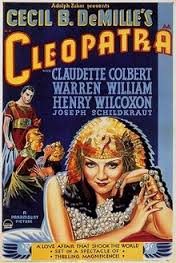
CLEOPATRA
US, 1934, 100 minutes, Black and white.
Claudette Colbert, Warren William, Henry Wilcoxon, Joseph Schildkraut, Ian Keith, C. Aubrey Smith.
Directed by Cecil B. de Mille.
Cecil B. de Mille had established himself as a leading director of screen spectacle in the 1920s with his 1923 The Ten Commandments and his 1927 The King of Kings. With the coming of sound, he made quite a number of different genres of films but returned to spectacle in 1933 for the early Christian story, The Sign of the Cross. Claudette Colbert appeared as the Empress Poppaea to Charles Laughton’s Nero. In 1934 he made Cleopatra, again with Claudette Colbert (who won the Oscar that year for her performance in It Happened One Night). Warren William is Julius Caesar and Henry Wilcoxon is Mark Antony.
The film was made before the impositions of the code in the early 1930s – and some of the costumes (and lack of them) might surprise audiences used to the later spectacles.
Claudette Colbert is a strong Cleopatra as is Henry Wilcoxon as a strong Mark Antony. This gives the film some force – if not any history.
In the next decade Vivien Leigh was Cleopatra in the film version of George Bernard Shaw’s Caesar and Cleopatra. Of course, most audiences are aware of Elizabeth Taylor in the 1963 film, Cleopatra.
1. How impressive was this as a classic movie? A movie milestone in cinema spectacular?
2. How did the presentation of the film reflect the styles of the early thirties? The emphasis on lavish spectacle, the lack of emphasis on characterization and plausibility? Attracting audiences to wonder rather than to think?
3. How does this film evidence the changing tastes of cinema audiences over the decades? The contrast with later versions of 'Cleopatra'?
4. How interesting was the historical background of the film? How well did the plot reconstruct history? The picture of life and politics In Egypt, the role of Cleopatra, the invasion of Rome? The influence of Caesar, of Antony, of Augustus?
5. How attractive was Claudette Colbert as Cleopatra? The strengths of the characterization, weaknesses? Her beauty and charm? Her fascination for Caesar and for Antony? The quality of the dialogue he was given to speak? The style of direction, with the emphasis on being seductive, postures? Innuendo? Did this give a convincing account of Cleopatra as one of the most fascinating women of history?
6. Comment on the characterization and presentation of Cleopatra in particular sequences, for example the encounter in the desert at the beginning, the initial meeting with Caesar from the rug, the plot to kill Caesar and Cleopatra's killing? her visit to Rome? The repetition of similar sequences with Antony? Her using him, seducing him, loving him and yet planning to kill him? How impressive was she in her death? At Antony's death? Was she presented as credible character, even in this spectacular film?
7. How interesting the presentation of Caesar? His ambitions, his attitude towards Cleopatra and Egypt, his status in Rome, bringing Cleopatra to Rome? Did he love her at all or merely use her?
8. The contrast with Antony as blunt? His arrogance and then his succumbing, to Cleopatra? The detail of his infatuation with her? His giving up his ambitions and army career? The contrast with his behaviour in Roman days? How lost was he in the world of Cleopatra? Forfeiting his ambitions and his achievement?
9. The picture of Octavian as jealous and ambitious? The role of Herod between Octavian and Antony? The sinister characterization of Herod?
10. How much attention to detail did the film give as regards Egyptian politics and court life?
11. The film’s attention to Rome and its way of life, for example, Calpurnia and her dinner?
12. Comment on this film as a Cecil B. De Mille spectacle.
Published in Movie Reviews
Published in
Movie Reviews
Tagged under